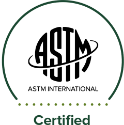ASTM Cannabis Certification Program

Managed by the Safety Equipment Institute and in cooperation with ASTM International Committee D37 on Cannabis, this program provides the first of a kind quality system and product safety certification to cannabis and hemp producers.
ASTM’s Cannabis Certification program draws from Committee D37’s growing list of approved standards, along with other established good manufacturing and good agriculture practices specific to cannabis.
Open to all cultivators, extractors, and producers, in includes a quality system GMP audit of your facility operations, plus testing of cannabis flower samples using ASTM Standards, if applicable. Once approved, cannabis businesses can use the ASTM certification mark on authorized product packaging and highlight in marketing materials.
Demonstrate to key industry stakeholders and customers that your company is committed to best practices that ensure consumer and patient health and safety.